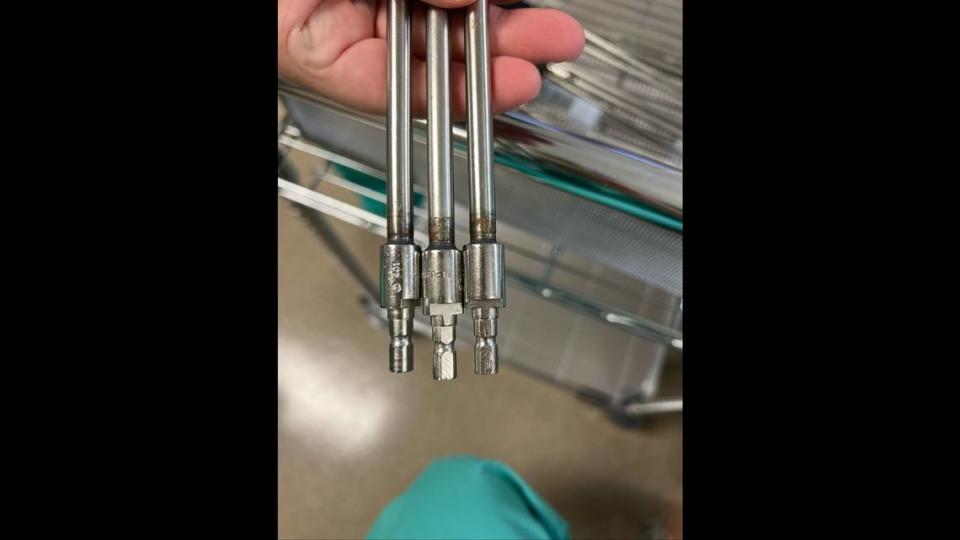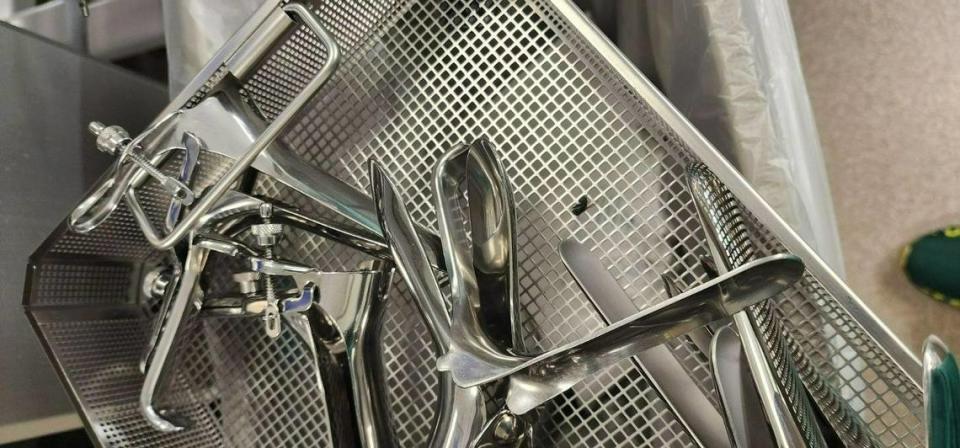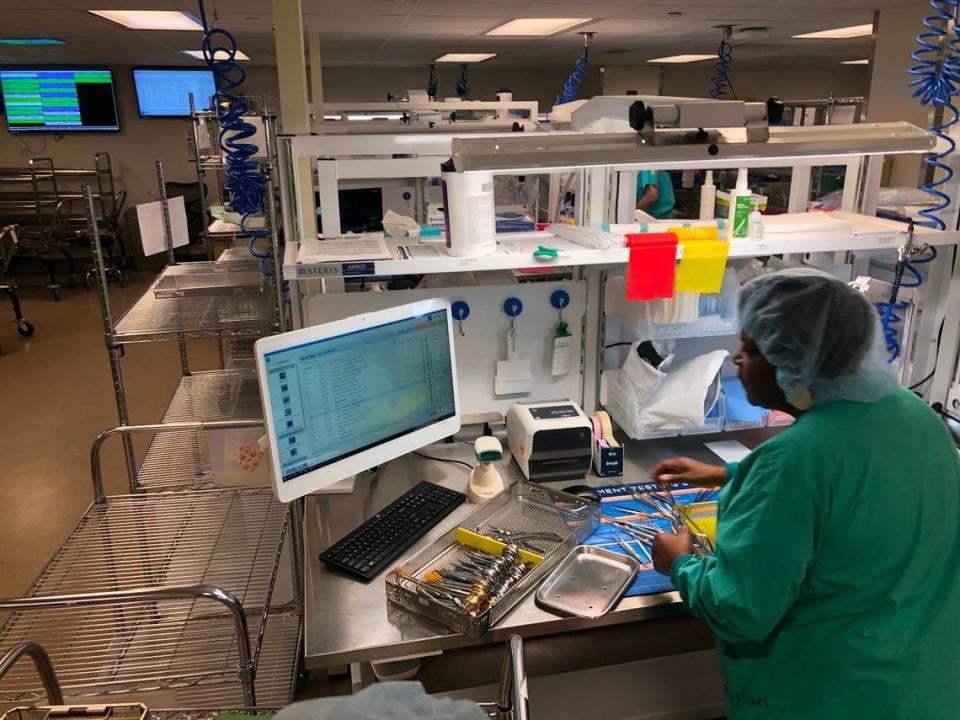‘Made me sick’: KC hospital had cockroaches, rusted instruments, ex-employee says
Former employees of Saint Luke’s Hospital of Kansas City are alleging the hospital, part of the Saint Luke’s Health System, failed to properly clean and repair operating room instruments, used rusty instruments during operations and failed to address an ongoing problem with cockroaches and other bugs in and around the operating room.
Sunday and Monday, the former head of the hospital’s Sterile Processing Department filed numerous complaints against the hospital, with the U.S. Equal Employment Opportunity Commission, the Occupational Safety and Health Administration, the Joint Commission and the Missouri Department of Health and Senior Services.
Hospital officials on Tuesday countered those claims, saying their sterile processing department was state of the art, especially after it underwent an $8 million renovation in January. They added the hospital has spent about $7.5 million since 2021 on new instruments, which they clean using a 14-step sterilization process.
But the former employees said it’s not an issue with the physical system, but rather with operating room staff who prevented the sterile processing department from complying with best practices.
Elizabeth Bell, in Monday’s complaint to the EEOC, wrote that “Saint Luke’s sterile processing practices created a heightened risk of danger and serious physical harm to its employees and patients and jeopardized its accreditation.”
Bell, who from September 2022 to July 2023 served as Saint Luke’s first Sterile Processing Manager, was ultimately fired. She believes her termination was retaliation for speaking out about sterilization concerns.
Now, she works as a sterile processing team leader at the Mayo Clinic in Phoenix. Bell said the differences in the culture of safety between hospitals is “night and day.”
Hospital staff, including Dr. Michael Main, who works as senior vice president at Saint Luke’s and chief executive officer of Saint Luke’s Physician Group, invited journalists to tour the sterile processing department at the hospital at 4401 Wornall Road on Tuesday afternoon, after reporters reached out requesting comment Monday.
“We take all of this very, very seriously, and will look into it very, very carefully, but as I said, we looked at the processes today and we took that tour, and it does not match with the complaints that have been made ... that a non-sterile, non-clean, rusty piece of equipment could be used in the (operating room),” Main said. “It just doesn’t make sense.”
Rusty, broken instruments
Bell brought nearly 15 years of experience in the sterile processing industry across several hospitals to her role at Saint Luke’s.
She said among the most egregious examples she witnessed were the use of damaged and broken instruments on patients, a shortage of instruments needed to perform necessary surgeries and shortcuts taken while cleaning instruments between procedures.
Doctors “demanded” that instruments not up to safety standards be used daily on patients, despite access to newer instruments, Bell claimed in her EEOC complaint.
“As a result, patients undergoing surgery at Saint Luke’s were treated with chipped, rusty, cracked, dull, broken, obsolete, and bent instruments,” the complaint read.
Rusted or damaged equipment cannot be properly cleaned by federal and state standards, she said.

Bell’s complaint also accused some operating room surgeons of using homemade instruments, which she said meant they did not come with cleaning protocols, were not FDA approved and therefore should not be used. She also accused the hospital of failing to track and report breaches in sterilization practices to patients, saying in her complaint that the hospital claimed they “did not have time to scan these items into the tracking system.”
She said cockroaches, flies and other insects were found in areas that were supposed to be sterilized, including an operating room.
Bell also provided The Star with a photo of a small insect she said was found inside a package of sterile instruments that was sent to an operating room.
“Saint Luke’s has a well-known pest problem … I sounded the alarm many times over the pests and met with a pest control person due to my complaints and he basically told me that he can’t spray anything for the bugs because it’s a patient safety area,” she said.
“It made me sick,” Bell told The Star, noting improper sterilization procedures can mean the difference between life and death at hospitals, due to the risks of infections to patients.
‘Culture of non-compliance’
Bell said while at Saint Luke’s, she proposed numerous solutions, including hiring more staff to sanitize instruments, reducing the number of procedures performed each day so staff could adequately sterilize instruments between each procedure, and scheduling patients around when certain instruments were available.
She said the hospital did not heed most of her suggestions.
“Unfortunately, Ms. Bell quickly realized that her unwavering commitment to sterile processing compliance was not shared by Saint Luke’s operating room (OR) staff or surgeons,” the EEOC complaint reads. Bell is represented by Ryan McClelland, an attorney in Liberty.
Instead, according to the EEOC complaint, some male operating room doctors pushed back against her proposed changes, describing the sterilization process she proposed as a “burden.”
“On several occasions, Ms. Bell was berated and cussed at by surgeons in front of SPD staff, OR staff, and others ... Simply put, Saint Luke’s OR had no interest in changing the ‘culture’ of non-compliance that had existed for many years,” the complaint reads.
Bell said she reported what she viewed as the hospital’s non-compliance to Saint Luke’s director of employee relations on March 15, and also said she was being bullied, harassed and threatened on a near daily basis by male doctors. She said other women had been treated similarly.
“I reported it constantly,” Bell said. “The more that I reported it, the worse I felt like I was treated.”
According to the EEOC complaint, Bell was fired in July after she told hospital leadership that she had recorded a surgeon speaking to her in a way she found to be abrasive and inappropriate.
A few months earlier, in an email provided by Bell dated May 9, an operating room surgeon wrote to the hospital’s director of surgical services saying they learned from staff at other health system locations that the Kansas City location was the only facility that implemented an initial cleaning of used instruments in the operating room before sending them to the sterile processing department.
“I suspect that’s not helping with turnovers,” the surgeon wrote.
The director responded: “Cleaning instruments in the room at point of use has been a regulatory requirement for at least 10 years and unfortunately not fully adopted and implemented at Saint Lukes Hospital’s. All the hospitals will be adopting this and putting it into practice soon.”
Stacie Herrera, who until Oct. 10 worked in Saint Luke’s Sterile Processing Department, said while she left the job willingly, she felt she was being forced out for also voicing concerns.
Herrera, who was initially hired to focus on education and quality control in the department, said she would flag concerns with the hospital’s processes sometimes as often as once a day.
For example, she said, about a month before she left, an operating room technician needed an instrument and took one from her department before it was allowed. It had been cleaned, but not inspected or sterilized, Herrera said.
As for the cockroaches, Hererra said she saw one again a few weeks ago, adding that staff would turn the water on in the sinks to keep the insects from crawling up them.
“It was pretty concerning,” she said.
The hospital’s response
After requesting that media see the department in question, hospital leadership showed reporters where instruments are pre-cleaned in the sink, then sent through the washer, inspected, packaged and sterilized before going back out to operating rooms.
Main said he can’t comment on specific allegations raised by Bell, or authenticate the images she provided, which include a photo of a fly on a tray next to clean vaginal speculums, since litigation is ongoing. He also could not comment on Bell’s employment.

Main reiterated that the hospital prides itself on a culture of safety, and that he’s not aware of anything that would support the claims brought by Bell, including allegations of pests, failing or rusty equipment being used in an operation, and bullying.
“There just really isn’t any way that that type of thing could occur,” Main said, adding: “Everything that’s portrayed in those is antithetical to what we do here at Saint Luke’s ... this runs counter to everything we do.”
He said they take any claims that come forward seriously. But he questioned the complaints filed by Bell.
“I see nothing to support those claims,” he said. “As you saw in the process today, how would any of those things happen?”
“Could a piece of equipment that was rusty or dysfunctional go on to be used in a case?” Main asked. “I don’t believe that could happen.”
Hospital leadership in a statement Tuesday said they could not comment on the personnel matter, but said “We are proud of our rigorous sterilizing process and the experts who collaborate closely every day to ensure our patients are safe.”

A spokesperson for the hospital said Saint Luke’s is fully accredited by the Joint Commission, has a 5-star rating from Centers for Medicare and Medicaid Services and earlier this year received an “A” safety grade from the Leapfrog Group.
They said they also follow “rigorous processes and protocols,” with daily safety meetings. The surgeons are the last step in checking and verifying that all instruments are safe to use.
He said the photos have nothing identifying they were actually taken at Saint Luke’s. He said the claims are not consistent with anything he’s experienced in his 25 years there. Asked how much time he’s spent in the sterile processing department, he said it’s not an area he goes to.

